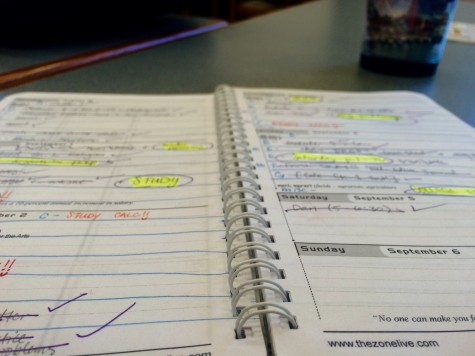Eight Commandments of a Successful Studier
It is 1:30 A.M. Papers are strewn across your bedroom floor. What you want to do is sleep, but what you need to do is study. Your AP Biology test that is in…oh wait, six and a half hours looms over your head. You already wasted 10 minutes looking for your pencil. Your clothes smell like junk food. You look (and feel) like a zombie and you can’t keep facts from all of your classes straight.
Don’t be this student.
School can be hard, but it doesn’t have to be. Follow these eight commandments of a successful studier and you shall have a year filled with carefree smiles and moments of pride while your classmates are struggling to finish assignments.
- Thou shall live by the planner.
Never again will you have to face one of those mini panic attacks when you realize that you forgot to do your math homework. At the beginning of the week, set aside a few minutes and update your planner with information from your classes’ assignment sheets. The planner is also a great place to include school events, friends’ birthdays and National Mole Day (October 23). Live by the planner and thou shall succeed.

Stay organized by keeping a planner! You can purchase a special Berkeley planner at the bookstore.
- Thou shall review thy work regularly.
According to a review of research on learning and teaching by Harvard Professor Michael C. Friedman, “learning occurs during the construction and review of notes.” During these events, students are able to make and strengthen connections between ideas, thus allowing deeper processing of content. Additionally, writing your own notes and reviewing them regularly tends to be more beneficial than reviewing another student’s notes because of the “generative processing” that occurs. Reviewing can be as simple as just reading your notes for a few minutes right after a lecture. You never know, those few minutes could be the difference between an A and B on the next test.
- Thou shall study in increments.
Studying in increments has proven to be highly beneficial in students’ abilities to retain information. Rasmussen College recommends studying in 30-50 minute increments with a 10 minute break at the end. Not only does this give you a chance to take a break from your textbook, but it also gives you time to process the information just reviewed or learned.
- Thou shall get rid of distractions.
As you work on your math homework, you suddenly hear a small voice from your phone: “Check me! Come on. You need a study break!” Everyone’s brains have been the field of battle for priority between your homework and social media. Try and eliminate as many of these distractions as possible. Keep any distracting electronics turned off and out of reach; don’t let your phone win the battle.

Phones and social media are probably the biggest distractions in our lives. A good idea is to just turn your phone off when in study mode!
- Thou shall discover one’s VARK.
VARK, which stands for Visual, Aural, Reading/Writing and Kinesthetic, are methods of learning and processing. Understanding your learning style will allow you to personalize your notes and develop new specific study habits. For example, visual learners will be able to learn most efficiently by drawing diagrams and charts while an auditory learner might listen to lectures online or attend discussions. If you do not fit into one of these factions, then you are divergent, also known as multimodal. Either way, this personalized study routine will allow you to discover a combination of strategies that will help you take information in and recall it when it is needed on the test.
- Thou shall change study places.
While some people swear by that magical corner in the library or the lucky desk chair, it is highly beneficial to change the place that you study often. According to the New York Times, changing your study spaces will allow you to retain information better. Because memory is associated with color, stepping away from your desk chair from time to time and studying in a new location is highly advantageous in your ability to recall information.
- Thou shall get enough sleep.
According to The Huffington Post, there is a direct relationship between the amount of sleep a college student gets and his or her GPA. Sleeping is necessary for focusing during class and on tests. More sleep is often associated with a higher GPA, which leads to happy parents, also resulting in a happy student. Thus, your eight-hour sleeps are essential to not only your grades, but also your physical and mental health.

Try to prevent procrastinating schoolwork, or else you’ll end up like this student sleeping in the library!
- Thou shall not cram.
Studies conducted by BBC found that cramming simply does not work for a variety of reasons, a main one being students’ inability to differentiate between being familiar with a term and knowing a term. Cramming is a highly ineffective way of studying because this last-minute preparation denies students the benefits of spacing out study times. Such benefits include better retention and less stress. Last but definitely not least, cramming overworks the brain and increases anxiety, irritability, and moodiness in a time when your brain needs to relax. Thus, study a little bit every day instead of the night before. Write out a to-do list. Balance your time. Evade cramming as much as possible and thou shall succeed.

Sarah, a current senior and avid people-watcher, was previously an Arts and Entertainment Editor and News Editor for "Fanfare." In addition to being...

